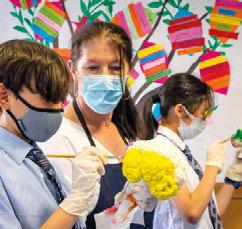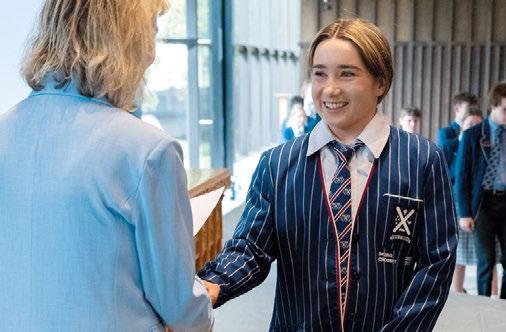
3 minute read
Exciting enrichment programmes on offer
Exciting enrichment
programmes on offer
It has long been accepted that gifted and talented students need extra support to reach their full potential in their academic, cultural, and sporting pursuits.
St Andrew’s College has a range of exciting programmes and initiatives in place to provide this support, including the well-established Academic Extension and Enrichment (ACEE) programme for academically able students.
Assistant Head of Secondary School (Academic), Helaina Coote, says the programme starts with ACEE classes in Years 9–10, and supports students throughout their schooling. “Our philosophy is to provide opportunities for students’ gifts and talents to emerge, and for us be flexible, finding ways to enrich and extend their learning in ways they absolutely love.”
The driving force of the ACEE programme is Teacher in Charge of Academic Extension and Enrichment, Ellen Hampson, who is passionate about helping students to reach their potential. “There should never be limits. Students need to fly as high as they can at this time of their lives and be supported to do so.” compete in, the regular programme includes Future Problem Solving, the Model United Nations Conference (MUNA), Model European Union Conference, World Scholars Cup, Ethics Olympiad, and Brain Bee, a neuroscience competition for Year 11 students. Megan Simpson, Isobel Forsey, Chantelle Xiong, Tamaroa Connelly, and William Couper (all Year 11) have committed to the annual New Zealand Brain Bee Challenge in 2022.
“For the last five years, St Andrew’s College has hosted the Philosophy Conference, now called the Thriving Mind Conference, which we hope to host again in August. In May, we will be the first New Zealand school to host the Da Vinci Decathlon, which sees schools compete in teams of eight across 10 academic disciplines.”
A ‘power team’ of six of the College’s top academics are currently working on the Water is Life research project, which sees them collaborate with students from around the globe on the health and sustainability of the world’s water. Helaina says this project is a great example of how Ellen engages students with authentic ideas and issues, and asks them to consider how they can harness their academic capabilities in real life situations. “One of our strengths at St Andrew’s is that all of our students, whether or not they are in the ACEE programme, are enriched by their teachers across every department. We are all in this together and contribute to their success.”
In Years 9–10 ACEE classes, students work with a specialist teacher, on a range of high level learning units based on philosophy, anthropology, coding and electronics, neuroscience, political science, sustainability, robotics, physics, and astrophysics. “In Year 9, students complete an individual impact project, which must demonstrate a positive impact on society or community. In Year 10, they typically complete a group impact project. Some of the exciting things students have come up with include a shark detector, and CO2 meter,” says Ellen.
Multi-levelling is another option to extend students, with some being accelerated within specific learning areas, taking NCEA levels a year earlier than their peers, or attempting Scholarship in Years 11 and 12. By the time some students reach Year 13, they may have exhausted the options available to them under the NCEA framework, which is when other opportunities, such as the University of Canterbury STAR programme, become invaluable, says Ellen. “We currently have eight students enrolled in the STAR programme. It is very important for us.”
Although COVID-19 has impacted some of the events that ACEE students in Years 9–11 typically participate or
Mia Fraser and Alexandra Irwin (then Year 11) participating in the 2021 Brain Bee neuroscience competition at the University of Otago.

Teacher in Charge of Academic Extension and Enrichment, Ellen Hampson, painting cauliflower ‘brains’, with Year 9 ACEE students, Ewan Mander and Daisy Huang.










